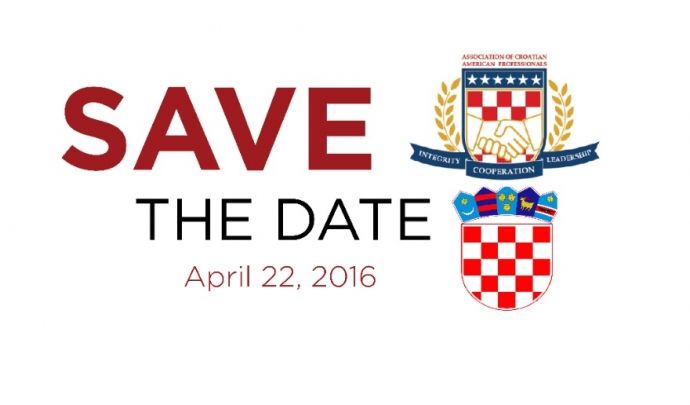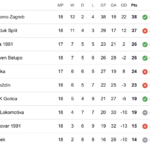Croatia’s diaspora is spread all over the globe, with the largest concentration in the United States. One of its most prominent members, Dr. Steven Zivko Pavletic, was recently interviewed by TCN on a range of topics concerning the Croatian diaspora.
As part of our efforts to highlight the Croatian diaspora around the globe, TCN recently requested a joint interview with the two of Croatia’s most prominent figures in Washington, Ambassador Josip Paro and Dr. Steven Zivko Pavletic MD MS. Ambassador Paro’s interview was recently published on the site (read it here), part of which reappeared in leading Croatian daily Jutarnji List on January 31, 2016.

We are delighted to continue with Dr. Pavletic’s answers below. Pavletic is a very active member of the Croatian community in America, and some of the hats he wears include President, “Hrvatska Ura”, Washington DC, Vice-President ACAP, President Medicine and Helath Sciences Section, and Chair, local organizing committee, 1st ACAP Conference later this year.
Almost half of the Croatian diaspora is in America. How would you describe the relationship between the homeland, and tell us a little about the population dynamics – are more people moving back home or vice versa?
The Croatian diaspora in the United States has a long tradition and Croats immigrated during several waves starting from the early 19th century through modern days. As you know, traditionally strong communities exist in the Los Angeles, Chicago, Cleveland, Pittsburgh, New Jersey and Missouri areas. Estimates vary but it is fair to say that about one million Croats or their descendants live in the United States. My definition of the Croatian diaspora exceeds these traditional constraints and now, in times of unfettered communications and travel, I also include under this broader term their extended families and close friends. With the increasing number of Americans traveling to Croatia each year exceeding 300,000; the size of the constituency rooting for Croatia in the United States today is stronger than ever before.
The relationship with the home country has also been changing over the centuries. There is no doubt that distances compound the love and pride for the home country. It is not overkill to say that most expatriates have an especially potentiated sense of patriotism, perhaps because they tend to mostly remember the good things, but from a distance they can also see more things that could be done better in the home country. Here is their useful contribution to the discussions on what future directions Croatia could take to further increase its strength and prosperity.
Nowadays with the elimination of distances in communication and cultural and economic globalization, it is fair to say that the old sense of nostalgia has become obsolete and is being replaced by the sense of participation in the global community, global Croatia, but also global Europe, global America, and the global realm of professional communities. This is the huge new opportunity for Croatia and its diaspora to capitalize on these trends. In that light, the nature of the Croatian diaspora is also changing. Today, the volume of immigration to and from the USA is not that large as in some of the past periods, but most immigrants or people moving back home are highly skilled educated workers and professionals.
The Croatian diaspora I belong to is here in Washington DC and is a prime example of changing times. Almost exclusively, everyone here is highly educated and highly successful in their professions, and there are many hundreds of us in DC area. These are all first or second generation immigrants but many are also temporarily here as students, diplomats on assignments for the Croatian government or working for other organizations. The old term “brain drain” or “brain gain” may very well become obsolete in the current times of rapid communications. I personally spend many hours each week on my correspondences and work on projects with my professional colleagues, hematologists in Croatia, as if they were in the next-door office. The question is now, how can we increase these new opportunities and build a larger scale system for collaborations, and build upon these examples of success.
A new government, a new opportunity. What is the level of interest of Croatia’s diaspora entrepreneurs in returning home, and what are their main concerns?
A very interesting question, my answer is – let’s find out the facts. I am not aware of existing information on the level of interest of Croatian American entrepreneurs in returning home but it may be worth a study. The newly formed Association of Croatian American Professionals (Link at: http://www.croampro.com/) is tasked with stimulating networking and awareness of entrepreneurs and high-end professionals, and will hopefully soon become an effective mechanism for identifying such individuals and trends. For people to returning home from the United States, there are some very well known, serious legal barriers that need to be addressed, such as double taxation or overall lack of trust in the business environment in Croatia. The new Croatian government definitely brings a new wind of opportunities to stimulate the spirit of enterprise, international collaboration and joint investments in new ideas. We have high quality people here but they need to be engaged. With a prime minister who is technically part of our diaspora, and a president who is well known and loved here, opportunities for an authentic progress in this arena are unprecedented.

How active is the Croatian diaspora? Can you give some examples of proactive events?
There is a long history of Croatian organizations in the United States with clubs, churches, and numerous music and dance groups. Traditionally, the most important Croatian institutions in the United States are National Federation of Croatian Americans (NFCA) and the Croatian Fraternal Union (CFU). The supportive role that Croatian Americans provided during the homeland war for independence are well recognized. The times today are fortunately different, the Croatian diaspora in the United States is looking for a cause to engage in amongst themselves and that would benefit Croatia. One example is the case of “Hrvatska Ura” (“Croatian Hour” in English; Link: http://croura.org/about.html) which was founded in 2010 in Washington DC with the intention of providing the Croatian American professional community with a venue for meeting and networking. The activities of “Hrvatska Ura” bring lectures and events from various areas of endeavors to the Croatian Embassy in Washington DC. The Embassy provides space for these events, which are now well recognized in the Washington community. It is an example of a successful collaboration between the Croatian government and the local diaspora, with priceless and durable benefits. We also want to acknowledge the visionary roles of the former and current ambassadors of Croatia to the United States; Mrs. Grabar-Kitarovic and Mr. Josko Paro both opened the embassy to these events.
The “Hrvatska Ura” example is probably just a reflection of changing times among the Croatian diaspora and a reflection of a new awareness of its growing strengths and need for self-organization. The recent formation of the national Association of Croatian American Professionals (ACAP) is a reflection of this trend on the national level. The goals of the organization could be summarized as: “Global Croatia” and “To Connect”. The Association’s mission is to foster knowledge sharing and networking among Croatian American professionals, encourage Croatian-American business and trade, and work with other Croatian-American and Croatian organizations on matters of common concern.
The ACAP is having their first in-person Conference in Washington, DC on April 22, 2016 (more at: http://www.croampro.com/). This conference will be held jointly with the Embassy of the Republic of Croatia. The planned program for April 22 will include panel discussions covering diaspora organizations, medicine, law, politics, engineering, education, arts and science. National and international guest speakers have accepted invitations and keynote speakers include the successful Croatian-Canadian entrepreneur Robert Herjavec and former U.S. senator Mark Begich, as well as others. ACAP is addressing all Croatian professionals in North America and their counterparts in Croatia, and other international Croatians. We have currently 200 pre-registrants from all over the United States and Croatia. Based on the growing number of new member professionals from the all spectrum of endeavors joining, we think the ACAP idea has developed brilliantly and is on track to become a key mechanism and promotor of a new era for global Croatia. This will be possible to achieve only in collaboration and coordination with all other existing Croatian American organizations with much longer experience and traditions.
With the Croatian President’s American connections and PM Tim Oreskovic’s Canadian ones, there is a slightly more North American feel to politics in Croatia. How engaged is the diaspora in domestic politics, and how do you assess the last few turbulent weeks and the road ahead?
That’s true about the slight “North American feel” but only as an afterthought. Mrs. Grabar-Kitarovic was very much liked here but so is she in Croatia. We did not know who Tim Oreskovic was until he became a candidate for Prime Minister. Yes, I personally like their unique and high quality professional backgrounds and their familiarity with North America. But much more than that, I think their holding of these high level offices reflects the will of the Croatian people and the electorate’s desire for change. I am not a politician, but a physician and scientist, and I can’t speak in informed way about any possible influences on the Croatian domestic politics. However, it’s my impression that such influences don’t exist. This is because there are no viable mechanisms for that to happen, and it’s probably better so. Several hundred people who vote in Croatian elections at the embassies in the United States, symbolism aside, can’t make a significant difference. It is unclear if the recently established Croatian government offices for Croats abroad and the Council for the issues of Croatian people abroad are exerting a meaningful impact when it comes to Croats in North America.
What probably can make a difference is an authentic desire in Croatia to reaching out and identify commercial, research or developmental projects of mutual interest. I can see immense creative energies of the American Croatian diaspora that are dormant but ready to help and get engaged – no different than in 1990s but now on a new goal. Personally, I am interested in how could we decrease the number of cancer deaths in Croatia. In spite of all the progress in medicine and a great tradition of biomedical research in Croatia, the number of cases and deaths from cancer in Croatia has been continuously rising over the last 20 years and is among the highest in Europe. Croatia has great doctors, a tradition in biomedical science and universally accessible health care, so it should be possible to better utilize these assets. Focus on improvements in cancer control also has a developmental potential in health, innovation and businesses and also as a regional initiative. Without a stronger and internationally more competitive health care infrastructure it will be impossible to incite further growth of Croatia as an attractive year around tourist and retirement destination. I truly look forward that the new Croatian government will be stable and long lasting and able to implement necessary changes for such progress to happen.








